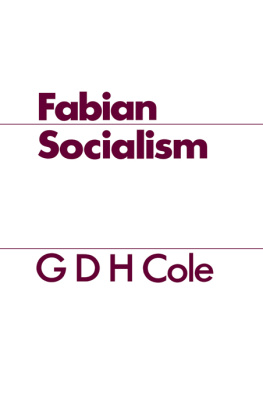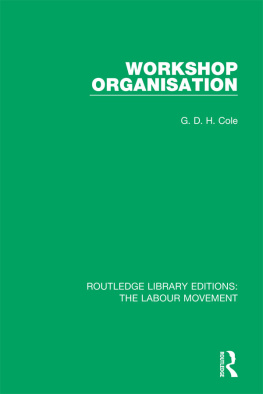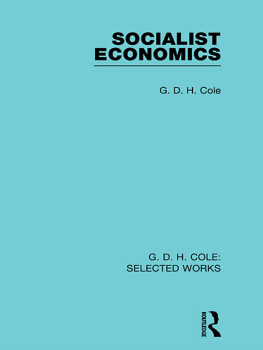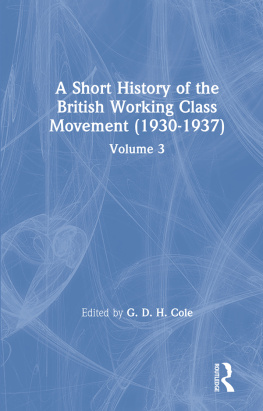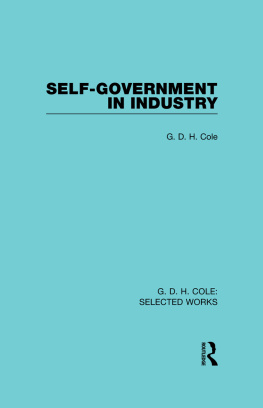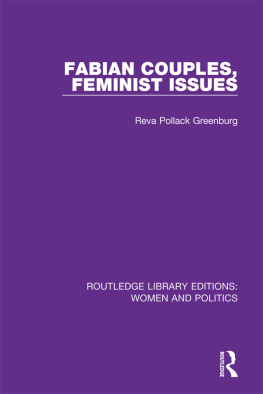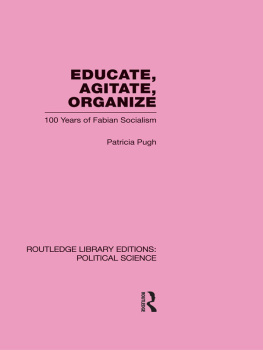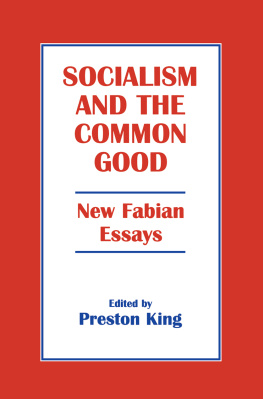FABIAN SOCIALISM
FABIAN SOCIALISM
by
G. D. H. COLE
Published by
FRANK CASS AND COMPANY LIMITED
2 Park Square, Milton Park, Abingdon, Oxon, OX14 4RN
by arrangement with George Allen & Unwin Ltd.
First published April 1943
Second impression May 1943
Third impression 1971
Transferred to Digital Printing 2005
ISBN 0 7146 1553 6
PREFACE
I BEGAN writing this book in August, 1941, when I was at the Fabian Societys Summer School at Dartington Hall. I was moved to write it by the insistent demand which was there made for a new Socialist crusade, based on a new interpretation of Socialism in the light of the conditions created by the war. We were all then in a mood of excitement and emotional exaltation, stimulated by the recent attack of the Nazis on the Soviet Union, and by the news that was coming through daily of the magnificent, but at that time seemingly desperate, resistance offered by the Red Army to the onslaughts on Leningrad and Moscow. We felt that, though we could do little directly at that stage to help the Russians in their struggle, it was at any rate our affair, as Socialists, to hold out to them the hand of comradeship, and to dc all we could to create in this country a Socialist movement which would be capable of playing a proper part in winning both the war and the peace.
Out of that gathering much more than this book was born. Since the autumn of 1941, the Fabian Society, on the strength of its revived work for Socialism, has been gaining members and influence at an unprecedented rate; and local Fabian Societies have been springing into existence all over the country as fast as we have been able to organise them. The Society has issued, in a booklet entitled A Word on the Future to British Socialists, its own re-interpretation of Socialist ideas and doctrine in the light of present-day conditions; and I have myself told something of its current activities in a second booklet, The Fabian Society, Past and Present.
A much longer time than I anticipated has gone by before it has been possible to get the present volume into the hands of the public. This has given me the opportunity of revising it in a number of respects; but one outstanding event, the publication of the Beveridge Report on the Social Services, occurred after the manuscript had finally left my hands. Actually, the chapter of my book dealing with Social Security (A Chance for Everybody) was finished in 1941, and has not been touched since. I mention this point only because its close similarity at many points to the Beveridge proposals might lead to a suspicion of unacknowledged plagiarism if I did not. My chapter was also written before, and quite independently of, the important evidence submitted by the Fabian Societys Social Security Committee to the Beveridge Committeeevidence since published under the title of Social Security, and also bearing a remarkably close resemblance in many of its features to what Sir William Beveridge has proposed.
I ought to add that my book, despite its title, is not to be regarded as in any sense an official Fabian publication. I happen to be Chairman of the Fabian Executive; but the views expressed are mine, and they have no responsibility for them. My views are not to be regarded as orthodox Fabianism; for the Fabian Society, I am glad to say, has no orthodoxy. It is a free-thinking body of liberal Socialists, in the sense in which I have used the word liberal in this book; and I hope most Fabians will agree with most of what I have said. But this is only a hope, and not an assertion. May I add to it the further hope that those who agree broadly with the spirit of what I have written will join the Fabian Society and, by working through it for sensible Socialism, help to make of it the engine of mental revolution of which the British people stands in urgent need.
G. D. H. COLE.
HENDON,
December, 1942.
I
PERSONS AND POLITICS
SOME day, quite soon, when this war is over and the Nazis have been beaten and the terror lifted from the peoples, you and I, if we are still alive, will have to rebuild England. I say England, because I am an Englishman and feel that in England is my home and my land of hearts desire. But, though I say England, I mean, and have to mean, much more; for how can we hope to build a happy England in an unhappy and distracted world? If I were a Scot, or a Welshman, or an Ulsterman, I expect I should think first of all of Scotland, or of Wales, or of Northern Ireland (or perhaps of Ireland as a whole). If I were a Frenchman or a German or a Russian, I should think first of my own countryof the sort of life I want to live in it, and the lives I want my fellow-countrymen to be able to lead. But, from whatever point my thoughts began, and to whatever point they came continually back, I should have to think about other countries as well as my own. For there is nothing more positive than that, of whatever country I feel myself a citizen, the fate of my country is bound up with what happens to the world at large.
I wish I did not have to think in this enlarged way; for it makes thinking very difficult. It would be hard enough to plan out a decent future for England, and to find ways of acting with my fellow-Englishmen so as to make our dreams come true, without troubling our heads about the affairs of other countries. It is none too easy a matter to make up ones mind how England ought to be governed, or how we should set about the task of rebuilding England after the devastations of war. But enough has occurred in our own day, and is happening even now, to show us clearly that we cannot succeed if we plan for ourselves alone. We all but brought sheer destruction upon our country by not planning with others how to prevent Hitlers aggressionthat is, by our failure to form a common front of peace-loving countries strong enough to make Hitler afraid of attacking them. That failure has cost us the misery into which we are plunged to-day; and it should be plain to all of us that there can be no secure escape from such misery unless, in beating Hitler, we also make and carry out effective plans for enabling all Europe to live in peace and friendship in the coming times.
We have, then, to attend to the affairs of Europe, and of the whole world, as well as to those which are more particularly our own. But, for most of us, though this is true, the main responsibility is connected with the affairs of our own country. For we cannot, except by helping our utmost to defeat the Nazis, do much about the rest of the world, whereas we can do a great deal to affect what happens here in England. We shall do what we are called upon to do here all the better if we do it with insight into what our actions mean for the citizens of other countries, and if we act with the feeling that we are their comrades in a common task. But our chance of acting is bound to be mainlythe actual fighting aparta chance of acting here, in our own country; and it is mainly through what we do in our own country that we can hope to affect the world.
But can we do anything? Very many men and women are inclined to say that, in times such as these, there is really nothing they can do. Of course I do not mean literally nothing; for at present most of them are working very hard. They are in the armed forces, or the home defence services, or the munition factories or mines, or the merchant marine, or in some other of the countless branches of activity that make up the war effort. Or perhaps they are carrying on with their ordinary peace-time jobs, in the knowledge that these are no less indispensable, and are working a good deal harder than usual because so many of those who used to work with them have been taken away for services more directly connected with the war.


